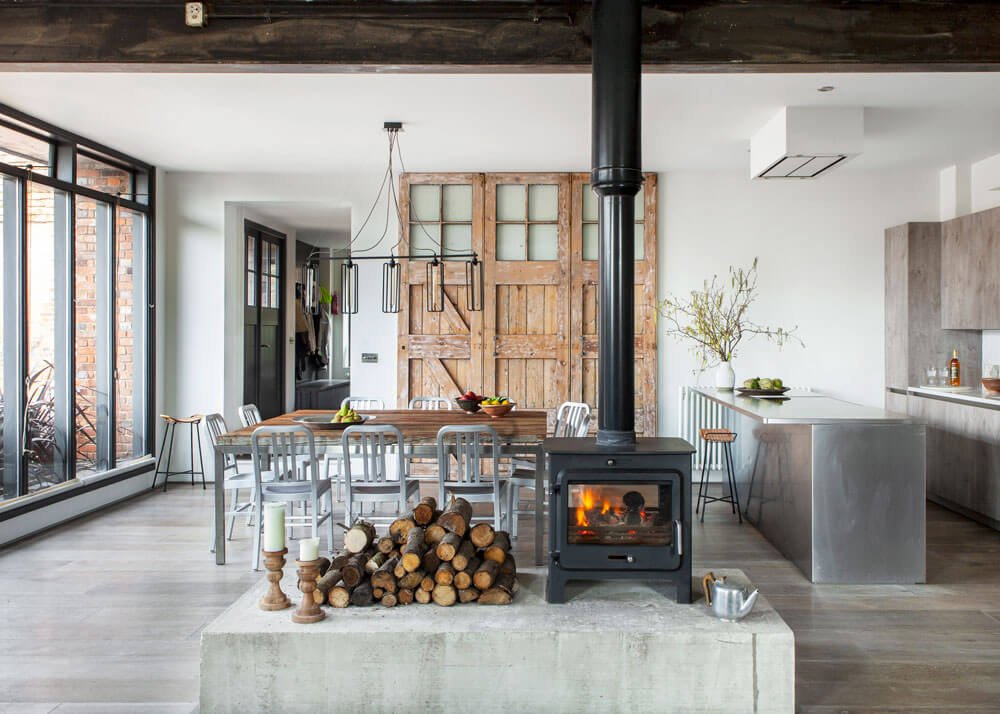My DOMtips: How to achieve the modern rustic style
Designing a modern rustic home can be quite the balancing act, as it requires great instincts to blend seamlessly the simplicity of modern design with the warmth of rustic charm. A successful design, however, can create a beautiful, cosy, and inviting atmosphere keeping the space feeling very stylish. But the main question is, how do you achieve this look?
There is no simple answer but worry not, because this month on the DOMjournal, we bring you our DOMtips to get that modern rustic style that led to St. John receiving the Architect’s Journal Retrofit Award. Come on in and see why this holiday home is a top destination among guests and the press.
1. Let there be light
Natural light plays a vital role in every design, but in the modern rustic style, it can transform your space from feeling overwhelming and heavy to bright and airy. When possible, prioritize placing windows to capture the morning and afternoon sun in the areas where you spend most of your day, and consider adding skylights to bring light into darker areas. Additionally, incorporating outdoor spaces such as terraces, decks, courtyards, and balconies with large sliding or glass doors can create a seamless transition between indoor and outdoor spaces, allowing more natural light to fill the room. At St. John, we lined through the doorways and windows to create a visual vista between two courtyards through the main space, creating a wonderfully dramatic architectural experience.
2. Just be natural
When designing a modern rustic home, it's essential to use natural materials such as wood, stone, and brick that provide an organic feel and tactile quality to the space. Select materials that are durable and can withstand wear and tear. For example, we exposed the original brickwork in certain areas and chose wide-engineered oak flooring, which runs throughout the ground and first floors and continues to clad the walls of the stairwell and bedrooms in the attic space. Additionally, a custom bench and coat rack by the entrance in similar wood paneling serves a utilitarian purpose but also creates a stylish corner to display items for our guests right when they come in. Work with local artisans, like carpenters or stonemasons, and don’t be afraid to ask for their expert opinion, if you’re unsure what the best solution for your project might be.
3. Naughty neutrals
A neutral color palette is ideal to create a warm and inviting atmosphere without the space becoming overwhelming. Shades of mushroom taupes, warm greys, and off-white are excellent choices for walls, soft furnishings, and decorations, but an occasional pop of color can also be used to bring attention and attract interest to a well-styled vignette. Consider establishing your color palette before making any decisions to avoid having buyer’s remorse down the line.
4. Balancing act
Mixing sleek and rough textures is an excellent way to create contrast, adding depth and interest to any space. It’s very important to find the golden ratio in every element, for example, in the kitchen and dining area we paired the greyed timber cabinets with stunning Carrera marble worktops and splash-backs and combined a more coarse, wooden dining table with recycled aluminium Emeco Navy Chairs 1006, reimagined by Philippe Starck. Don’t be afraid to experiment with your choices! The combination of materials creates a rustic feel while maintaining a modern edge.
5. Industrial chic
Industrial elements can be a fantastic addition to modern rustic design, as they bring a touch of modernity and urban edge to a more traditional aesthetic. Metal beams, exposed brick walls, and concrete floors are all great examples of industrial chic elements that create a unique contrast that adds visual interest. Referencing the medical past of St. John, which used to operate as an ambulance station, we installed a brushed stainless steel kitchen island, that breaks up the large space and compliments the sand-blasted kitchen cabinets. At the center of the room, a double-sided iron wood burner sits on a large concrete plinth, dividing zones of cooking, eating, working, and living.
6. Eyes on the prize
A focal point is essential to draw the eye and create a sense of balance while bringing visual interest to an otherwise empty space. Consider the size and scale of your room, as a larger living area with high ceilings may require a bigger statement than your study or bedroom. A focal point could be a fireplace with a gorgeous mantle piece or a wood burner, a large piece of artwork on the wall, or even a framed view if you’re lucky like us to have these gorgeous surroundings. The choice is yours; just don't add too many elements!
7. Go hunting!
No, we don’t mean actual hunting - antlers on the wall are not our style! Vintage finds, however, are; Antique and retro pieces are a sustainable solution that adds character and charm to your home, so consider incorporating vintage furniture, repurposed textiles, or even reclaimed wood. A modern rustic home should blend old and new seamlessly, so mix contemporary furniture with pieces that have a rich past to create a space that feels fresh and timeless. The local community in Rye offers an incredible selection of antique dealers and vintage shops, so if you’re in town be sure to check out our guide for our retail recommendations, such as Alex MacArthur Interiors, Soap and Salvation, and McCully & Crane.
8. The Big Bang
Statement lighting is an excellent way to add drama and set the tone in a room. Choose a chandelier, pendant light, or floor lamp that complements the space's style and gives you something to talk about at the next dinner party. At St John, a wrought ironwork light-fitting hanging over the large dining table always stirs up a conversation with our guests. Consider the placement and size of the fixture to ensure it complements the space's layout and doesn't overpower other elements in the room. Our recommendations from the tip above often have some excellent pieces for that va-va-voom!
8. Green = Happy
Plants and flowers are an excellent way to add life and color to your home, but most importantly they are known for reducing our stress levels and making us feel more at peace in a space. Choose plants that are easy to care for, such as ferns or monsteras, and consider the amount of natural light and humidity in each room. Outside, you will have a lot more room to play with, so select plants that will complement the scale, materials, and color palette of your home’s exterior. The design of the landscape can play a significant role in the overall feel, so a British walled garden, a layered wooden terrace, or even a pebbled courtyard will drastically change your experience of the space.
9. Less is more
When it comes to accessories, we are big believers in “less is more”. Choose simple, understated pieces that complement the space without overwhelming it. Consider using natural materials such as woven baskets or wooden bowls and add cosy textiles such as wooly blankets and throw pillows that are essential for your comfort. Focus on functionality and only accessorize with items that serve a purpose, while being stylish when not in use. The aim is to create a space that works well for everyday living - do you need it? Will it be used daily? If the answer is NO, don't get it!
10. Your home, your rules
This should come as no surprise to you, but we strongly advise you to steer clear of clichés, trends, and anything that doesn’t really speak to you personally. Rather than following the crowd and making your home look like a Pinterest board, stay away from the obvious choice and opt for items that genuinely resonate with you. Our home should reflect our identity. Ultimately, it's you who will be living there. And worry not, because a personal design will always set you apart and spark conversations.
To summarize, achieving the modern rustic look is all about striking a careful balance between the warmth of rustic charm and the sleek, functional aspects of modern design. This might require good instincts and a thoughtful and intentional approach but by following the ten tips outlined in this article, you can create a modern rustic home that feels inviting, comfortable, and stylish.
Remember that designing a modern rustic home, or any home for that matter, is a personal journey, and there is no cookie-cutter approach. Take the time to explore your personal style, research, and create a space that reflects your unique lifestyle vision.
Photography by Felix Speller, Voytek Ketz












